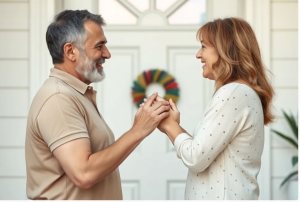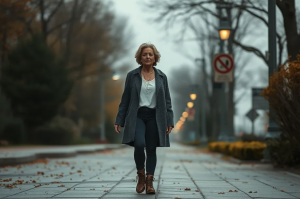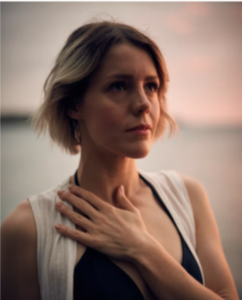The first time it was suggested to me that I stop trying to think up a solution to the situation I was trying desperately to solve, to figure it all out, it sounded a lovely idea. But truth be told, I had no idea how to put this advice into action. Resolution, for me, had always meant understanding what was happening, what it meant, and most of all, knowing what to do about it. Resolution had always involved excessive and obsessive thinking. If I didn’t want to live in anxiety and feel utterly unmoored, I had to solve the questions that were still unsolved. I had to think more, not less, about my difficulties. Living peacefully and not having the answers were incompatible; I needed a plan, a way out of the situation not a comfy chair inside it.
But over time, I realized that despite all the thinking humanly possible, there were important questions in my life that I couldn’t know and couldn’t solve, not yet anyway. This truth was unavoidable and irrefutable. I had to admit and accept that, with all my pseudo-knowing, my proposed and attempted solutions, I was still not any better off. Any knowing I had thought myself into was illusory. The more I tried to know, the more I felt like I didn’t know. On the other side of that admission and acceptance however, I found something unexpected…utter relief.
We live in an age of reason and science. We worship information, research, and logic so much that we named our era for it: the age of information. To reason is to think, to use the rational mind, understand, and make sense of our world. Over time, we’ve put more and more eggs in the reasoning basket, betting on thinking to save the day. The thinking mind is the road to salvation. At this moment in history, we’ve lost interest and, to some degree, respect, for all the other ways of knowing: bodily, intuitively, experientially, and so forth—all the ways we can know other than through thinking and logic.
When I present material as a public speaker, despite three decades of professional experience with human beings and their thoughts and emotions, I am almost always asked what MRI studies or research I can offer to support my observations on human behavior. Reason and scientific proof have been anointed as our kings. Thinking, we believe, will solve whatever questions and challenges life presents. And, with technology exploding, our faith in and reverence for thinking are only intensifying.
Living in the Question
“The only true wisdom is in knowing we know nothing,” said Socrates. A lot has changed in the 2,500 years since Socrates uttered those words. Our society now seems to disagree with the great philosopher on the issue of knowing. Here, in the 21st century AD, we believe that we should and can know everything. Our unceasing need to know the answers along with our unwillingness to accept the unknown sit at the root of our excessive thinking, and our anxiety.
Mystery, in our society, is not a real thing…it’s a flaky or woowoo thing. Not knowing the answer is not an acceptable answer. We’re taught from the time we’re born that knowing is good—we are good, worthy, if we have the answers. “You should know better” is what we hear when we’re young and have done something wrong. We feel shame and inadequacy when we don’t have the answers: It makes us feel weak and defective, vulnerable and lost. Not knowing is a form of failure.
At the same time, knowing feels safe; it feels like we’re in control. With the answers in place, we don’t have to face the impermanence that underpins our life, the reality that everything is constantly changing, whether we like it or not. We don’t have to feel how out of control we really are as human beings on this mortal and mysterious journey. As a result, we do a lot of faking it, “impostering,” when it comes to knowing. Simultaneously, we rush to answers that aren’t true or sustainable. We’ll do anything, essentially, to not reside in the unknown.
But despite what we’re conditioned to believe, life is forever depositing us in situations where we cannot know and don’t have access to the answers we want, don’t know the way forward, to say nothing of the larger not knowing—what we’re all doing here, existing, in the first place. Given the frequency with which the experience of not knowing or at least not yet knowing shows up in life, we would be wise to learn how to inhabit it and, even better, to do so with a sense of acceptance and relaxation rather than judgment and fear.
It may feel unfamiliar, unwise, and even dangerous to sit with a challenging, unresolved situation, to not know what it means, what we need to do about it, or how to get out of it. Uncomfortable though it may be however, it behooves us to learn how to not know, to feel what it’s like in the not knowing, and to await more clarity and the arrival of a path through. Living in the question, if we can drop our judgments about it, can become its very own place to reside. With practice, we can learn to actually relax with not having the answer.
When we offer ourselves permission to not know, we allow life to reveal what it wants to reveal, in its own time—without forcing it. The questions then, remarkably, become their own destinations. What’s more, we find that not knowing is a place that, if we have the courage to trust it, can deliver deeper and wiser solutions, real solutions, paths forward that are more reliable than anything we can mentally muscle our way into knowing.
Surrendering to living in the questions feels like dropping through a trap door. Suddenly we are deposited into the present moment; we have permission to be here, to experience what life is like—now. We have permission to get interested in the experience of this reality and allow the answers to reveal themselves on their own timeline. Just for now, we don’t have to do it all ourselves, don’t have to push our way through with our mind, as we’ve been taught. Relaxing into the questions, unexpectedly, allows us to join a larger unfolding, a process bigger than ourselves, and thankfully, one in which we don’t have to be responsible for controlling our life at every turn. At last, it isn’t up to only us. Living in the questions, no matter how uncomfortable it might feel, is living in the truth, which, once we get the hang of it, contains its own safety and trustworthiness. The safety we experience in the truth, however, is not because we have all the answers or because the truth is comfortable (the usual markers of safety), but rather because the truth is inarguable…because the truth is what is. Surrendering to not knowing means planting our feet in moving ground and accepting that we’re in a process without a known outcome and that the process is the destination for now.


